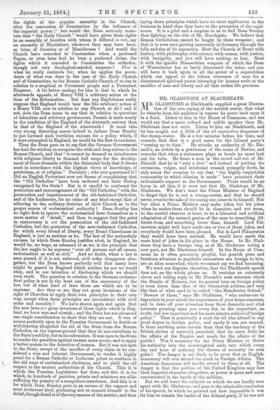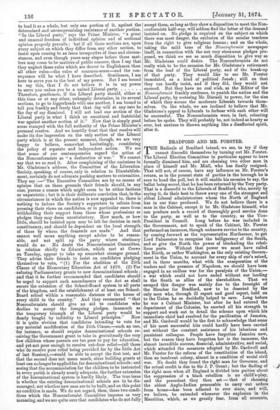KR. GLADSTONE AT BLACKHEATH.
NEB. GLADSTONE at Blackheath supplied a great illustra- 1 tion of his own saying of the natural orator, that what he absorbs from his audience in vapour he pours back upon it in a flood. Listen to him in the House of Commons, and one would say that a more refined and subtle speaker than Mr. Gladstone does not exist. Listen to him on Blackheath, and he has caught not a little of the ad captandam eloquence of the stump-orator. He is a few minutes before his time, and remarks that that is a good omen for the Liberal party's "coming up to time." He attacks an authority of Mr. Dis- raeli's, an article by a gentleman of the name of Bowles, and remarks that when a statesman plays at bowls he must look out for rubs. He hears a man in the crowd call out of Mr. Disraeli that he is "only a Jew," and instead of putting the erroneous, vulgar, and intolerant remark promptly down, he only seizes the occasion to say that " the highly respectable community to which allusion is made " have promised their enthusiastic support to the Government. There would be no harm in all this, if it were not that Mr. Gladstone Mr. Gladstone. We don't want the Prime Minister of England to forget that he is not a stump-orator, and that he should never, even for the sake of becoming one, cease to be himself. Not but what a Prime Minister may make jokes, but his jokes when he makes them should be in character, and not seem, to the careful observer at least, to be a laboured and artificial adaptation of the natural genius of the man to something dif- ferent from, and something lower than, himself. Lord Pal- merston might well have made one or two of these jokes, and everybody would have been pleased. But in Lord Palmerston they would have been natural. He would have made the same kind of jokes in his place in the House. In Mr. Glad- stone they have a foreign ring, as of Mr. Gladstone acting a new part, not Mr. Gladstone himself. In the House of Com- mons he is often genuinely playful, but poorish puns and facetious allusions to pugilistic encounters are foreign to him, are an alien somewhat, which we cannot say we find becoming.
We need not disguise, therefore, that the Blackheath speech does not, on the whole, please us. It contains an extremely clever and telling reply to Mr. Disraeli's rash nonsense about the Straits of Malacca, but its general tone on foreign policy is even lower than that of the Greenwich address, and very like that of what used to be called " the Manchester School." " Beware of those," says Mr. Gladstone, " who endeavour to depreciate in your minds the importance of your home concerns, and to draw off your attention from those domestic and vital interests pressing upon you every day, to the important, no doubt, but less important and far more remote, subject of foreign policy." That is practically a snub for all who attend in any great degree to foreign policy, and surely it was not wanted.. Is there anything more certain than that the tendency of the British elector is narrowly parochial, that he cares little for the affairs of the Empire and much for the affairs of the parish ? Was it necessary for the Prime Minister to throw his authority into the overweighted scale into which every day and hour of ordinary life throws of necessity its own grain ? The danger is not likely to be great that an English democracy will ever attend too much to Foreign Affairs. The American democracy will hardly attend to them at all. The danger is that the politics of the United Kingdom may lose their Imperial character altogether, as power is more and more concentrated in the bands of the millions.
But we will leave the subjects on which we can hardly ever agree with Mr. Gladstone, and pass to the admirable conclusion of his speech, in which he pointed out how impossible it was for him to remain the leader of the Liberal party, if he was not to lead it as a whole, but only one portion of it, against the determined and uncompromising resistance of another portion. " In the Liberal party," says the Prime Minister, "a great and unusual freedom of individual opinion and of sectional opinion properly prevails ; but if all those sections are, upon every subject on which they differ from any other section, to insist upon coming to an issue irrespective of time and circum- stances, and even though years may elapse before these mat- ters may come to be matters of public concern, then I say that they neglect those rules which are dearer to Englishmen than all other rules—the rules of common-sense—and the con- sequence will be what I have described. Gentlemen, I am here to serve you to the best of my power. But I am bound to say this, that I do not believe it is in my power
to serve you unless you be a united Liberal party Therefore, gentlemen, if the Liberal party should, either at this time or at any other, unhappily determine, in its several sections, to go to loggerheads with one another, I am bound to tell you frankly and freely that that day will at any rate be the day of my dismissal. I will not lead one section of the Liberal party in what I think an unnatural and fratricidal war against another section of it." Now that is simply good sense stamped with the full authority of the Prime Minister's personal resolve. And we heartily trust that that resolve will make its due impression on the only section of the Liberal -party which is at the present moment, though, we are very -happy to believe, somewhat hesitatingly, considering the policy of separate and independent action. We see that some of our contemporaries regard the action of the Nonconformists as " a declaration of war." We cannot say that we so read it. After complaining of the omissions in Mr. Gladstone's address, the Committee of the Liberation 'Society, speaking, of course, only in relation to Disestablish- ment, certainly do not advocate pushing matters to extremities. They say :—" The Executive Committee are by no means of opinion that on these grounds their friends should, in any case, pursue a course which might seem to be either factious or unpatriotic ; but it is their deliberate conviction that, in the circumstances in which the nation is now appealed to, there is nothing to induce the Society's supporters to refrain from pressing their views on candidates, or in particular cases from withholding their support from those whose professions or pledges they may deem unsatisfactory. How much, or how little, should be insisted upon may be left for decision in each constituency, and should be dependent on the local strength of those by whom the demands are made." And that cannot well mean anything except advice to be reason- able, and not split up the party where obstinacy would do so. No doubt the Nonconformist Committee, in relation chiefly to Education, which met at Crewe on Tuesday, appear to take up somewhat stronger ground. They advise their friends to insist on candidates pledging themselves to vote, "(1) For the abolition of the 25th Clause of the Elementary Education Act of 1870. (2) For refusing Parliamentary grants to new denominational schools ; and that it be further recommended that candidates should be urged to support such amendments of the Act as shall secure the extension of the School-Board system to all parts of the kingdom, and the establishment of at least one School- Board school within a reasonable distance of the house of every child in the country." And they recommend " that Nonconformists should give no aid to candidates who decline to accept the foregoing pledges, inasmuch as the temporary triumph of the Liberal party would be
dearly bought by infidelity to Liberal principles." Now it is quite obvious that candidates intending to vote for any material modification of the 25th Clause,—such an one, for instance, as should require denominational schools re- ceiving the Government grant to take in gratuitously the very few children whose parents are too poor to pay for education, and yet not poor enough to receive out-door relief—(all those -who do receive poor relief being provided for by the little Act -of last Session),—would be able to accept the first test, and that the second does not mean much, since building grants at least can no longer be applied for, for denominational schools; and seeing that the accommodation for the children to be instructed in every parish is already nearly adequate, the further extension of the denominational system is hardly likely. The true issue is whether the existing denominational schools are to be dis- couraged, not whether new ones are to be built, and on this point no condition is made. We do not regard, then, these two condi- tions which the Nonconformist Committee imposes as very menacing, and we are quite sure that candidates who do not fully accept them, so long as they show a disposition to meet the Non- conformists half-way, will seldom find the letter of the demand insisted on. No pledge is required on the subject on which there was most danger, the exclusion of the secular teachers from the right to give religious lessons ; and on the whole, taking the mild tone of the Nonconformist newspaper itself, in connection with the not very strenuous pledges pro- posed, we think we see as much disposition to give way as Mr. Gladstone could desire. The Nonconformists do not really wish to be the occasion for Mr. Gladstone's retirement from the lead of the Liberal party, and of the break-up of that party. They would like to see Mr. Forster immolated, as a kind of political Jonah ; still on that they can hardly insist, and if they did, they would not succeed. But they have no real wish, as the Editor of the Nonconformist frankly confesses, to punish the nation and the Liberal party, by restoring Mr. Disraeli to power, for the sins of which they accuse the moderate Liberals towards them- selves. On the whole, we are inclined to believe that Mr. Gladstone's appeal to Liberals to forbear with each other will be successful. The Nonconformists were, in fact, relenting before he spoke. They will probably be, not indeed as hearty as ever, but anxious to disown anything like a disaffected spirit, after it.



































 Previous page
Previous page